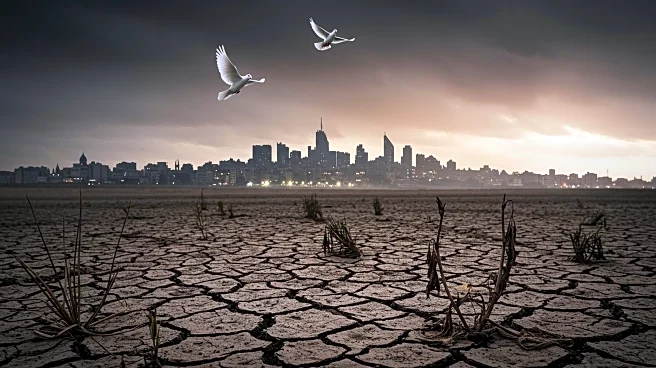What's Happening?
The Integrated Food Security Phase Classification (IPC) has declared a famine in Gaza City, marking the first such declaration in the Middle East. The IPC report indicates that the famine could spread to other areas like Deir al-Balah and Khan Younis if the ongoing conflict and restrictions on humanitarian aid persist. The situation has been exacerbated by Israel's military offensive and blockade, which have severely restricted food and aid supplies, leading to starvation among Palestinian civilians, particularly children. Despite Israel's recent measures to increase aid, the United Nations reports that the amount of food reaching Gaza remains insufficient. Israeli Prime Minister Benjamin Netanyahu has rejected the IPC's findings, calling them an 'outright lie,' while the U.S. State Department has also expressed skepticism, attributing the difficulties in aid delivery to Hamas and looters.
Why It's Important?
The declaration of famine in Gaza City is a significant humanitarian crisis that could increase international pressure on Israel to alter its military and aid policies. The situation highlights the severe impact of prolonged conflict and blockades on civilian populations, particularly in densely populated areas like Gaza. The famine declaration could lead to increased calls for a ceasefire and a reassessment of aid delivery mechanisms to ensure that sufficient food and medical supplies reach those in need. The crisis also underscores the broader geopolitical tensions in the region, with potential implications for U.S. foreign policy and international diplomatic efforts aimed at resolving the Israeli-Palestinian conflict.
What's Next?
The IPC warns that without immediate intervention, a third of Gaza's population could face catastrophic hunger levels by the end of September. The United Nations and other international bodies are likely to increase their calls for a ceasefire and a significant scale-up of humanitarian aid. Israel may face mounting international pressure to allow more aid into Gaza and to reconsider its military strategies. The situation could also lead to increased diplomatic efforts from countries involved in mediating the conflict, including the United States, Egypt, and Qatar.
Beyond the Headlines
The famine declaration raises ethical and moral questions about the responsibilities of warring parties to protect civilian populations and ensure access to basic necessities. It also highlights the challenges faced by international organizations in delivering aid in conflict zones, where access is often restricted, and security risks are high. The crisis could lead to long-term shifts in how humanitarian aid is coordinated and delivered in conflict areas, potentially prompting reforms in international aid policies and practices.









